|
|
|
Sort Order |
|
|
|
Items / Page
|
|
|
|
|
|
|
| Srl | Item |
| 1 |
ID:
106263
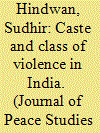

|
|
|
| 2 |
ID:
192303
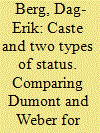

|
|
|
|
|
| Summary/Abstract |
In this article I argue that the concept of status requires more attention in today’s scholarly approach to caste. Caste has become a contested concept which authors define in multiple ways, but the different definitions of status in India’s caste system remain unclear. This article focusses on the two seminal contributions of Louis Dumont and Max Weber. Both have frequently been criticised and dismissed, but this article aims to delineate and compare their different understandings of status. Their contributions have often been judged according to their cultural significance or general concepts of modernity; however, by unpacking their approaches to status, a proper distinction can be made between achieved and attributed status in the study of caste. Thus, revisiting and comparing Dumont’s and Weber’s different concepts of status may create greater clarity when explaining ‘exclusion’ and the evolving caste practices in India and in the diaspora.
|
|
|
|
|
|
|
|
|
|
|
|
|
|
|
|
| 3 |
ID:
148513
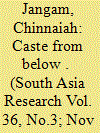

|
|
|
|
|
| Summary/Abstract |
Based on the life of the noted Chindu Yakshagana performer, Yellamma, this article presents the lived experience of caste through the lens of India’s Dalits, as narrated by the Chindus, a dependent caste of Madigas of Telangana. This provides a glimpse into the inner world of caste-based relationships through analysis of a satellite caste system that remains inaccessible to the dominant Hindu Brahmanical world and most scholarship on caste. Satellite castes function as preservers of social memory and act as cultural archives, enacting caste histories and origin myths, while critiquing and inverting dominant perceptions and weaving positive stories. The article argues that there may well be much more to this performative protest than merely social subversion.
|
|
|
|
|
|
|
|
|
|
|
|
|
|
|
|
| 4 |
ID:
165936
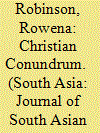

|
|
|
|
|
| Summary/Abstract |
The question of what constitutes the content of civility even as we seek to empty it of rigidly conceptualised Western understandings remains important. An interesting possibility is to reanimate the idea of civility with the notion of trust, but that again begs the question: ‘what is trust?’ My thinking on this subject is framed by constitutional values, and from that perspective, I perceive the ‘civility–trust’ dyad as being the social evocation or impression of the constitutional value of fraternity about which Ambedkar spoke in the Constituent Assembly. He suggested something of a content to fraternity which can then be employed to think through our understanding of civility. Against this backdrop, I listen to the voices of Tamil-speaking Dalit Christians and activists and the ways in which they try to come to terms with and struggle against the forms of incivility and ‘second-class’ citizenship they are up against, and how they make any sense of this with regard to constitutional values and Christian ones, both of which they should be able to lay claim to, but in which they are denied full participation.
|
|
|
|
|
|
|
|
|
|
|
|
|
|
|
|
| 5 |
ID:
140463
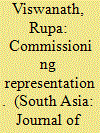

|
|
|
|
|
| Summary/Abstract |
Commissions of inquiry are unique tools of modern governance that represent ‘the people’, but in a manner quite unlike parliaments and other forms of elected political representation. Using as its example the 2007 Misra Report, this paper reveals how, in the production of a commission report, scores of non-state actors—‘stakeholders’ from a wide range of social strata—are enlisted to produce the policies that will then redound upon those very stakeholders. In thus consulting the people and eliciting their speech, commissions serve to publicly enact, in a controlled setting, the deliberative ideal of democracy that is otherwise absent in India. In this particular instance, the problematic status of Dalits is subsumed under the normative religious identity of the post-colonial Indian nation, a conclusion whose emergence through reasoned debate is publicly enacted in the form of the commission.
|
|
|
|
|
|
|
|
|
|
|
|
|
|
|
|
| 6 |
ID:
159755
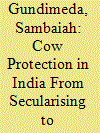

|
|
|
|
|
| Summary/Abstract |
Cow protection, a potent tool in the hands of cow vigilantes for atrocities against Muslims and Dalits, has become a heavily politicised issue in contemporary India. Its roots, connecting the themes of caste-Hindu religious sentiment, communalism and economic reasoning, can be traced to the late nineteenth century, though basic problems over the intriguingly complex use of cattle are clearly much older. This article relates contemporary cow protection debates specifically to Arya Samaj arguments against cow slaughter in the late nineteenth century and publication of a special issue of the journal Kalyan, titled Gau Ank, in 1945. The discussion shows how cow protection debates in the Constituent Assembly of India and in subsequent post-independence judicial verdicts were heavily influenced by these two earlier discourses. Analysing two landmark judicial decisions on cow slaughter, the article argues further that recent judicial endorsement of cow protection legitimises Hindu majoritarian sentiments in the law, while depriving millions of Indians, not just Muslims, of fundamental rights to food and livelihood. The conclusion attempts to consider some possible solutions to the current impasse.
|
|
|
|
|
|
|
|
|
|
|
|
|
|
|
|
| 7 |
ID:
148512
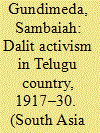

|
|
|
|
|
| Summary/Abstract |
This article argues that the politics of lower castes and their struggles for social equality and political representation cannot be effectively subsumed under a homogenous non-Brahmin category. Contesting the argument that the mobilisation of the lower castes/non-Brahmins in southern India was organised around the ideology of Dravidianism, this research examines what is today called Dalit activism in the Telugu country, related to the ideology of Adi-Dravida/Adi-Hindu. It also identifies discrimination of Dalits as well as between Dalits, in times before Gandhi and Ambedkar appeared on the scene.
|
|
|
|
|
|
|
|
|
|
|
|
|
|
|
|
| 8 |
ID:
178425
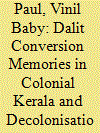

|
|
|
|
|
| Summary/Abstract |
This article seeks to decolonise knowledge of the conventional history of Dalits’ Christian conversion and its implications in colonial Kerala. As the missionary archive is the only source of Dalit Christian history writing in Kerala, in this historiography social historians have been unable to include the memories of Protestant missionary work at the local level by the local people themselves. Their experiences and rich accounts are marked by dramatic actions to gain socio-economic freedom and to establish a safe environment with the scope for future development. This article identifies how Dalit Christians themselves, in a specific locality, remember their conversion history, suggesting thereby the scope for a valuable addition to the archive.
|
|
|
|
|
|
|
|
|
|
|
|
|
|
|
|
| 9 |
ID:
143546
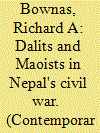

|
|
|
|
|
| Summary/Abstract |
This paper examines the role of Dalits in Nepal's 1996–2006 civil war (or ‘Maoist People's War’) through field research conducted in 2014 in three villages in mid-western and mid-eastern Nepal. The aim of the paper is to illuminate Dalit struggles at the village level which have gone more or less unnoticed both in academic literature and in civil society debate in metropolitan Nepal. Dalit activists in certain locations had been mobilizing under the radar for many years before the People's War. These activists were able to co-opt the Maoist guerrilla movement at the local level to oppose caste discrimination, while arguably, being themselves afterwards co-opted into the Maoists’ national campaign for state power. Empirically, this paper uses detailed findings about changes in caste discrimination practices in three villages where Maoist–Dalit interactions varied greatly to assess the successes and failures of this local level Dalit activism. Theoretically, it parses this episode of activism through debates about the nature of struggles for modernity in rural Nepal, arguing that we might be missing forms of locally grounded ‘modernizing’ struggles that do not fit some typical conceptualizations in social theory.
|
|
|
|
|
|
|
|
|
|
|
|
|
|
|
|
| 10 |
ID:
170539
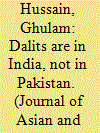

|
|
|
|
|
| Summary/Abstract |
This paper is an attempt to investigate the discursive bases of the categorical and identity-based choices available to the Dalits under the Ashrafia hegemony, and the resultant denial of Dalitness prevalent among the Dalits and the Sindhi civil society in, Pakistan. Informed by the Ambedkarian (subaltern) perspective, I analyse the conversational interviews conducted with the Dalit activists (mostly Scheduled Castes), and with their Ashrafia class counterparts. Interrogating the superior status of Sayed caste(s), I contend that the the denial of casteism, the opposition to the use of the ‘Dalit’ identity marker and the negation of the Dalitness seemed to have as much to do with the belief in Ashrafia values as it had with the normative sanction of the Savarna. values.Both the Savarna and the Ashrafia values seemed to seek legitimacy from the dominant ethnocentric forms of the politicized Sufism. Political Sufism merges the Savarna and Ashrafia norms by means of the syncretic narrative based on interfaith harmony and the civilisational rhetoric. Ashrafisation (also Savarnisation) and the reverence towards Sayeds were the key self-perpetuating hegemonic processes underlying the attempts by the Dalits and the civil society activists to dissipate cognitive dissonance underlying the existing Dalitness and the Ashrafia hegemony. I, therefore, conclude that the practices and the narratives prevalent in Sindhi civil society undermined the Dalit agency to come up with their own counter-hegemonic and emancipatory narrative(s).
|
|
|
|
|
|
|
|
|
|
|
|
|
|
|
|
| 11 |
ID:
082491
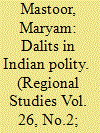

|
|
|
| 12 |
ID:
082557
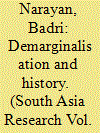

|
|
|
|
|
| Publication |
2008.
|
| Summary/Abstract |
The article demonstrates how the ongoing demarginalisation of Dalits in India today works on a variety of levels. Through creating new narratives and virtually inventing a new alternative history and language, this movement for demarginalisation uses a particular style of popular and widely circulated booklets, vigorously read and disseminated by the neo-literate Dalit population. The construction of this alternative history through such new texts, seen as an existential necessity for the Dalits, works by weaving together stories found in religious Brahminical popular texts about dissenting lower caste characters, glorified as Dalit heroes who fought against upper caste oppression and injustice. It also includes stories of unsung Dalit freedom fighters, transformed into local myths. Importantly, the language used is different from Standard Hindi, since folk proverbs, idioms and symbols, as well as the grammar and vocabulary of local dialects, are used. The article demonstrates in some detail how these processes of constructing new literature work, and indicates that these new sources may well be laying foundations for the histories of the future of many subaltern communities of South Asia
|
|
|
|
|
|
|
|
|
|
|
|
|
|
|
|
| 13 |
ID:
148403
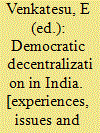

|
|
|
|
|
| Publication |
Oxon, Routledge, 2016.
|
| Description |
xxviii, 269p.: figures, tableshbk
|
| Standard Number |
9781138219632
|
|
|
|
|
|
|
|
|
|
|
|
Copies: C:1/I:0,R:0,Q:0
Circulation
| Accession# | Call# | Current Location | Status | Policy | Location |
| 058858 | 320.8054/VEN 058858 | Main | On Shelf | General | |
|
|
|
|
| 14 |
ID:
091724
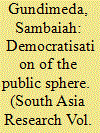

|
|
|
|
|
| Publication |
2009.
|
| Summary/Abstract |
Equality of treatment for all citizens and their cultures in public places is one of the prominent declarations of the secular Constitution of India. The hegemony of Hindu culture in the public sphere, however, reflects a dichotomy between stated declarations and social reality. Placing Dalits at the bottom of the caste hierarchy, if not outside it, 'mainstream' Hindu culture not only marginalised but importantly rejected the Dalits and their culture. This article examines the saga of the demand for a beef stall by the Dalit students in Hyderabad Central University and argues that the rejection of the culture of any community injures the human agency of that community. It is proposed that such injury can be healed only by a dialogical process, involving assertion of positivity and pride in the culture of the injured and positive recognition of such assertion by the injurer. Democratisation of the public sphere can be actualised by according representation to marginalised cultures, but in addition such representation needs to be accompanied with respect.
|
|
|
|
|
|
|
|
|
|
|
|
|
|
|
|
| 15 |
ID:
174914
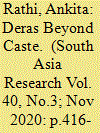

|
|
|
|
|
| Summary/Abstract |
In the northern regions of India, the rising popularity of alternative religious sects, prominently Deras, has sparked much interest in explaining this phenomenon. Current literature, based on case studies of specific Dalit Deras, relates the emergence of these religious sects to caste-based social discrimination and exclusion of lower castes by the mainstream Sikh religion. This article presents a case study of a small town, Patran, in the state of Punjab. Confirming the popularity of these alternative religious sects for upper and lower castes in the town, the article argues that the contemporary attractiveness of Deras needs to be understood also as a result of localised agrarian dynamics and related social pressures engendered by the process of rural to urban and agrarian to non-agrarian transition.
|
|
|
|
|
|
|
|
|
|
|
|
|
|
|
|
| 16 |
ID:
152599
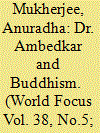

|
|
|
|
|
| Summary/Abstract |
Ambedkar was convinced that conversion will draw the Dalits out of their isolation. To him, Buddhism as a philosophy based on justice and not on the salvation of the soul could be the right religion for the Dalits. It was not meant to be an escape but a collective revolt that also , made a significant step in the resurgence of Buddhism in the country of its origin in all the glory of the humanity it preached.
|
|
|
|
|
|
|
|
|
|
|
|
|
|
|
|
| 17 |
ID:
137264
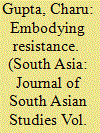

|
|
|
|
|
| Summary/Abstract |
Extending the paradigms of Subaltern Studies, this paper takes up three disparate sites—didactic Hindi literature, conversions and army discourses—to provide a perspective on the disjunctive forms of representation that signified Dalit bodies in colonial north India. Through different arenas, it shows how representations constituted, and were reflective of, the power relationships between upper and lower castes, in which the former reinstated their dominance. At the same time, the paper challenges straightjacketed links between representation and domination by expanding its archival arenas, and argues that Dalit bodies were not just screens on which high castes and colonial authorities projected their own caste, racial and gender anxieties. Rather, Dalits too represented themselves in different ways, conceiving a gendered sense of self in social, religious, public and political spaces. Such contested practices of representations produced creaks and dislocations in dominant embodiments.
|
|
|
|
|
|
|
|
|
|
|
|
|
|
|
|
| 18 |
ID:
170268
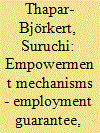

|
|
|
|
|
| Summary/Abstract |
The Mahatma Gandhi National Rural Employment Guarantee Act (NREGA) in India opens a new chapter in rural governance, signifying transformative potential for enhancing economic and social security. One of the key objectives of the Act is to aid in the empowerment of marginalised communities, especially women, Scheduled Castes (SCs) and Scheduled Tribes (STs). However, no analytically rigorous attempt has been made to study the mechanisms and processes that are leading to empowerment or even the (unintended) processes of disempowerment. Our paper investigates (dis) empowerment as a process rather than as a (quantifiable) outcome and analyses the mechanisms through which the embedded gender and caste norms are being challenged (though not completely eroded), but also how powerful actors at household, community and market levels can come to resent processes that entail upward mobility of women and marginalised communities. We draw on a comparative study based on extensive qualitative indepth interviews and participant observation, in rural areas of two Indian states, Uttar Pradesh (North India) and Andhra Pradesh (South India). The former exhibits almost all the elements we associate with low development, whereas the latter belongs to a group of southern Indian states with higher levels of human and economic development.
|
|
|
|
|
|
|
|
|
|
|
|
|
|
|
|
| 19 |
ID:
079533
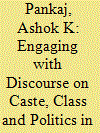

|
|
|
|
|
| Publication |
2007.
|
| Summary/Abstract |
This article maps the changing profile of pre-Mandal and post-Mandal debates on caste, class and politics in India, showing that the centrality of caste as an agent of politics and its dominant role in public-political life has remained a reality throughout. What is contested now is the extent to which recognition of caste as an instrument of socio-political change (following the Mandal Commission) and caste-centric socio-political movements of the 1980s and 1990s (the Dalit and Backward Class movements) has reinforced caste-centric public-political life by giving it a modern value and a secular purpose.
The article argues that the contemporary elaborate discourses on caste, class, and politics in India should seek to develop new paradigms for the discussion of caste and should interrogate more vigorously the democratic and secular roles of caste in relation to class and politics
|
|
|
|
|
|
|
|
|
|
|
|
|
|
|
|
| 20 |
ID:
190672
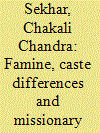

|
|
|
|
|
| Summary/Abstract |
This article sheds light on the conditions of Dalits, their experience of caste differences, discrimination and destitution during the Great Famine of 1876–78 in Rayalaseema, one of the Telugu-speaking regions of Madras Presidency. It highlights how existing caste practices defined and shaped famine relief measures, re-entrenching caste hierarchies. The caste location of Dalits aggravated the severity of their living conditions and social life in the village space and in relief works organised by the colonial government, which further reinforced caste inequalities and institutionalised social distancing. Consequently, Dalits experienced hunger, destitution and further marginalisation in society. During such conditions, the humanitarian concerns and charitable activities of missionaries had a profound impact on Dalits.
|
|
|
|
|
|
|
|
|
|
|
|
|
|
|
|
|
|
|
|
|